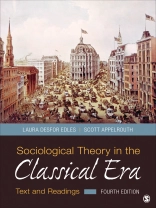Now available for the first time in both print and e-book formats
Sociological Theory in the Classical Era, Fourth Edition is an innovative text/reader for courses in classical theory. It introduces students to important original works by sociology′s key classical theorists while providing a thorough framework for understanding these challenging readings. For each theorist, the editors supply a biographical sketch, discuss intellectual influences and core ideas, and offer contemporary applications of those ideas. In addition to the seven major theorists covered, the book also connects their work to ‘Significant Others’—writers and thinkers who may have derived much of their own perspectives from Marx, Durkheim, Weber, Gilman, Simmel, Du Bois, and Mead.
Included with this title:
The password-protected Instructor Resource Site (formally known as SAGE Edge) offers access to all text-specific resources, including a test bank and editable, chapter-specific Power Point® slides.
Tabela de Conteúdo
List of Figures and Tables
Preface
About the Authors
Chapter 1. Introduction
Key Concepts
What Is Sociological Theory?
Why Read Original Works?
The European Enlightenment
The Ins and Outs of Classical Canons
Discussion Questions
Chapter 2. Karl Marx (1818–1883)
Key Concepts
A Biographical Sketch
Intellectual Influences and Core Ideas
Marx’s Theoretical Orientation
Discussion Questions
Chapter 3. Émile Durkheim (1858–1917)
Key Concepts
A Biographical Sketch
Intellectual Influences and Core Ideas
Durkheim’s Theoretical Orientation
Discussion Questions
Chapter 4. Max Weber (1864–1920)
Key Concepts
A Biographical Sketch
Intellectual Influences and Core Ideas
Weber’s Theoretical Orientation
Discussion Questions
Chapter 5. Charlotte Perkins Gilman (1860–1935)
Key Concepts
A Biographical Sketch
Intellectual Influences and Core Ideas
Gilman’s Theoretical Orientation
Discussion Questions
Chapter 6. Georg Simmel (1858–1918)
Key Concepts
A Biographical Sketch
Intellectual Influences and Core Ideas
Simmel’s Theoretical Orientation
Discussion Questions
Chapter 7. W. E. B. Du Bois (1868–1963)
Key Concepts
A Biographical Sketch
Intellectual Influences and Core Ideas
Du Bois’s Theoretical Orientation
Discussion Questions
Chapter 8. George Herbert Mead (1863–1931)
Key Concepts
A Biographical Sketch
Intellectual Influences and Core Ideas
Mead’s Theoretical Orientation
Discussion Questions
Glossary and Terminology
References
Index
Sobre o autor
Scott Appelrouth (Ph D, New York University, 2000) is Professor of Sociology at California State University, Northridge. His interests include sociological theory, cultural sociology, and social movements. He has taught classical and contemporary theory at both the graduate and undergraduate levels, and has published several articles in research- and teaching-oriented journals on social movements, theory, and the controversies over jazz during the 1920s and rap during the 1980s. His current research focuses on political discourse in American party platforms.












